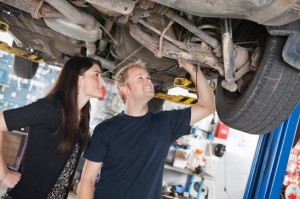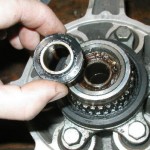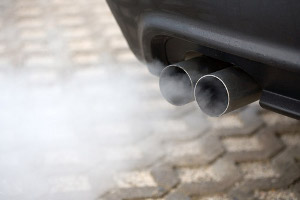 Have you ever stopped to think how amazing it is that auto makers have been able to consistently build more powerful engines in vehicles that get better fuel economy while at the same time meeting increasing environmental standards. One of the little miracles that helps make this happen is the Exhaust Gas Recirculation Valve or EGR Valve.
Have you ever stopped to think how amazing it is that auto makers have been able to consistently build more powerful engines in vehicles that get better fuel economy while at the same time meeting increasing environmental standards. One of the little miracles that helps make this happen is the Exhaust Gas Recirculation Valve or EGR Valve.
The EGR valve routes some exhaust back into the air intake system in both gasoline and diesel engines. The exhaust gas takes up some space in the engine cylinders, replacing some of the oxygen-rich air that would otherwise be in there. This means that the fuel burning event is cooler. Cooler combustion means fewer harmful nitrous oxides are produced.
Your EGR valve can get gummed up, messing up the timing and the amount of exhaust that is supposed to be recirculated in the engine. Symptoms of EGR valve problems are a rough idle and poor engine performance. Performance can be restored by cleaning or replacing the EGR valve, depending on how dirty it is.
EGR valves in diesel engines are particularly susceptible to becoming clogged because of the high soot content in diesel exhaust. ( The soot is ultimately filtered out of the exhaust further down the exhaust system, but not before it passes through the EGR valve).
There are a couple of things you can do to lengthen the life of the EGR valve in your diesel engine. First, extended idling allows for more soot buildup because the engine operating temperature is reduced as it idles; the valve is not opening and closing, allowing particulates to accumulate in the valve. Next is fuel quality. Diesel fuel has a cetane rating: the higher the rating, the better the combustion. Unfortunately, the cetane rating is rarely posted on the pump and can vary from location to location. Adding a cetane booster to the fuel tank can help with this problem.
So, if you’re experiencing rough idling or poor performance in your gas or diesel vehicle, have one of our Express Car Care technicians diagnose the problem. They can set things right and restore your vehicle’s performance.

 You wouldn’t walk into a different dentist’s office every time you needed your teeth cleaned. You wouldn’t pick someone at random every time you needed your hair cut, would you? And on tax day, would you trust your taxes to a stranger?
You wouldn’t walk into a different dentist’s office every time you needed your teeth cleaned. You wouldn’t pick someone at random every time you needed your hair cut, would you? And on tax day, would you trust your taxes to a stranger? It’s always exciting to get a new car – even when it’s used. But it can also feel like you’re going out on a limb a bit when you’re buying a used vehicle. I mean, people have a lot of reasons for selling their vehicles. Maybe they just wanted a new car, or maybe there was something that they personally didn’t like about the car. But then again, maybe there was something wrong with it or maybe there’s something really wrong with it.
It’s always exciting to get a new car – even when it’s used. But it can also feel like you’re going out on a limb a bit when you’re buying a used vehicle. I mean, people have a lot of reasons for selling their vehicles. Maybe they just wanted a new car, or maybe there was something that they personally didn’t like about the car. But then again, maybe there was something wrong with it or maybe there’s something really wrong with it. Driving down the road or around town, we’ve all heard a car or truck that sounds like it needs a new muffler. But there’s more to the exhaust system than just the muffler. The exhaust system has three main functions:
Driving down the road or around town, we’ve all heard a car or truck that sounds like it needs a new muffler. But there’s more to the exhaust system than just the muffler. The exhaust system has three main functions: Our vehicle is a very important part of our life and when it breaks down drivers need to get it back on the road as soon as possible – with the problem fixed right the first time.
Our vehicle is a very important part of our life and when it breaks down drivers need to get it back on the road as soon as possible – with the problem fixed right the first time. The axle assemblies in your vehicle transfer power out to the drive wheels. On the rear-wheel drive vehicle, there is an axle shaft that goes from the differential in the center of the axle to each of the rear wheels. On the front-wheel drive vehicle, the axle shafts go from the transmission to each front-wheel. All-wheel drive vehicles have axle shafts connected to all four wheels.
The axle assemblies in your vehicle transfer power out to the drive wheels. On the rear-wheel drive vehicle, there is an axle shaft that goes from the differential in the center of the axle to each of the rear wheels. On the front-wheel drive vehicle, the axle shafts go from the transmission to each front-wheel. All-wheel drive vehicles have axle shafts connected to all four wheels.


